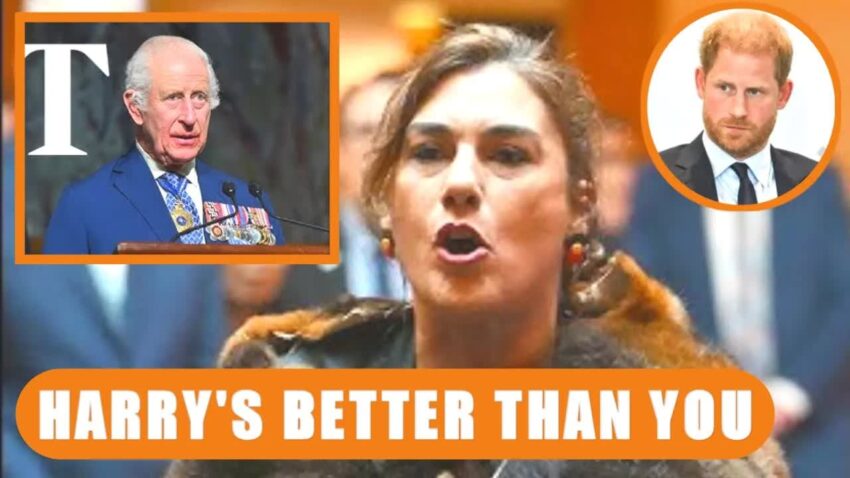In a dramatic turn of events during King Charles III’s recent visit to Australia, Senator Lydia Thorpe confronted the monarch, unleashing a torrent of accusations and demands that has since ignited a fierce national debate.
Her outburst, which included allegations of genocide against indigenous Australians, has raised eyebrows and divided public opinion on issues of respect, tradition, and the monarchy’s role in modern society.
As King Charles addressed the Australian Parliament, Thorpe interrupted him with shouts of “You are not my king!”
and demanded reparations for historical injustices faced by indigenous peoples.
This chaotic scene unfolded in the Great Hall of Parliament House, a venue typically associated with dignity and decorum.
Instead, it became a platform for Thorpe’s impassioned yet controversial display, leaving many Australians feeling embarrassed and uncomfortable.
Critics were quick to voice their disapproval of Thorpe’s actions, arguing that regardless of one’s political beliefs, there are certain standards of behavior that should be maintained, especially in the presence of a visiting monarch.
One commentator expressed disbelief, questioning who gave Thorpe the authority to speak for the entire nation.
Many felt her behavior was not only disrespectful to King Charles but also to the institution of the monarchy itself.
Prime Minister Anthony Albanese did not hold back, labeling Thorpe’s conduct as “disrespectful” and emphasizing that it fell short of the expectations placed upon parliamentarians.
The backlash against her actions was swift and widespread, reflecting a deep-seated concern over how such displays can tarnish Australia’s reputation on the international stage.
Thorpe’s confrontation has drawn parallels to the ongoing saga surrounding Harry and Meghan Markle, who have positioned themselves as champions of social justice while being vocal critics of the royal family.
By aligning her narrative with theirs, Thorpe risks alienating a large segment of the Australian population that still holds the monarchy in high regard.
The couple’s controversial choices have already polarized opinions, and Thorpe’s actions seem to echo their sentiments, albeit at a potentially significant cost.
While Harry and Meghan have garnered support for their advocacy on mental health and social issues, they have also faced backlash for perceived disrespect towards the traditions of the monarchy.
Thorpe’s interruption can be seen as a continuation of this narrative, blurring the lines between passionate advocacy and rudeness.
In a country that prides itself on democratic values, her actions have sparked questions about the boundaries of free speech.
Though advocating for indigenous rights is vital, the manner in which such discussions are conducted matters greatly.
Shouting at a monarch during an official address is hardly the way to foster constructive dialogue.
King Charles, who has dedicated years to building relationships with indigenous communities, deserves a level of respect that goes beyond political disagreements.
The incident has ignited a broader conversation about respect, representation, and the monarchy’s relevance in contemporary Australia.
While Thorpe’s commitment to indigenous rights is commendable, the approach she took has drawn widespread condemnation.
As Australia seeks to reconcile its colonial past, it is crucial to engage in discussions that promote understanding rather than deepening divisions.
In a nation known for its rugged landscapes and vibrant culture, this incident serves as a reminder of the complexities surrounding the monarchy’s place in Australian society.
As the public reflects on Thorpe’s actions, there is hope that future conversations about the monarchy and indigenous rights can occur with the dignity and respect they warrant.
The event raises significant questions about the future of Australia’s constitutional monarchy.
While some view the monarchy as a vital link to the nation’s history, others argue for a transition to a republic.
Thorpe’s actions have reignited this debate, with both sides using the incident to bolster their arguments.
Ultimately, the erosion of respect for tradition and authority is concerning.
The monarchy symbolizes continuity and stability, and disrespecting it undermines the values it represents.
The influence of figures like Harry and Meghan adds another layer of complexity, as their actions have emboldened others to challenge the monarchy in ways that may be deemed divisive.
As calls for accountability grow louder, the focus now shifts to how Australia can navigate these turbulent waters.
Respect and civility are fundamental to a functioning democracy, and while dissent is necessary, it must be expressed constructively.
The fallout from Thorpe’s confrontation may have lasting implications for the relationship between Australia and the monarchy, highlighting the need for respectful dialogue as the nation grapples with its identity and future.
